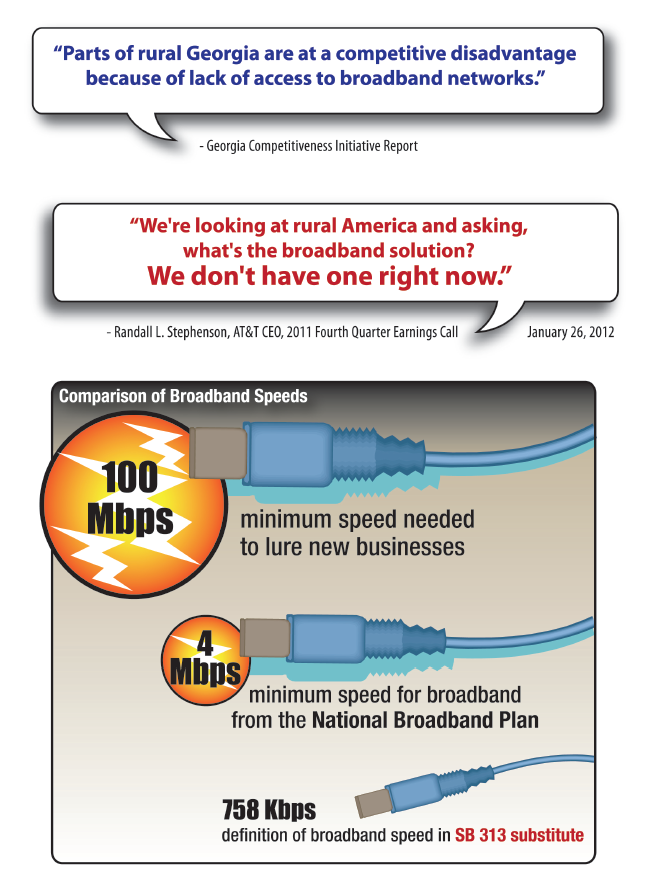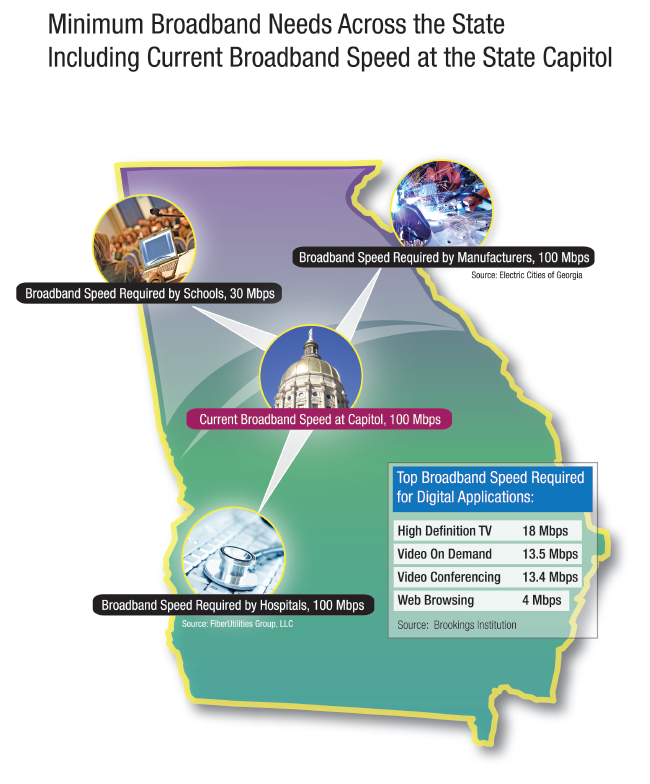
Fast, affordable Internet access for all.

In an effort to improve the area’s economic prospects, county officials have worked in recent years to secure funding to refurbish roadways and sewer systems—but they also know that, in a globalized marketplace, old-school infrastructure is not nearly enough. That’s why, in 2009, Orangeburg County applied for, and received, $18.65 million in stimulus money to finally give the area access to high-speed broadband internet. County Administrator Bill Clark and his colleagues envisioned a municipal, or muni, network that could reach roughly a quarter of Orangeburg’s rural population, including just over three thousand households and one hundred businesses. ... But the titans of telecom aren’t operating on quite the same wavelength. Since last January, AT&T, CenturyLink, and Time Warner have contributed just over $146,000 to politicians in South Carolina who back legislation that would cripple networks like Orangeburg’s. It’s only one example of a broader campaign by telecom companies to protect their cartel at all costs—even at the expense of keeping the country’s poorest on the wrong side of the digital divide for many years to come.Same story, different state. We've seen the same efforts across the U.S., which is why nineteen states have created barriers to community broadband. Meanwhile, the source of a lot of those barriers -- the American Legislative Exchange Council -- or ALEC has been getting attention for the many bad bills they have ushered through state legislators.
Bill Tapper, who owns a cabinet company with clients around the world, recalls a time just a few years ago when the Internet was so slow it hurt business. "The service we had in Monticello was horrible," he said. "My employees would sometimes take the data home where they had a better Internet connection than we did and do their uploads at night." Tapper said he lost out on business, but at the time the established Internet service providers like phone and cable TV companies told Tapper and other frustrated business owners in town that the city was wired sufficiently.

After the community voted in favor of a publicly owned fiber-optic network, the incumbent provider, TDS, filed a lawsuit. The lawsuit strategically succeeded in stalling the development of the new network but did not destroy the project. Even though the incumbent provider describes pre-network status as "just fine before the city got involved," TDS took advantage of the delay they caused to began building their own fiber network. Currently, subscribers in Monticello are benefitting from their high-speed fiber in ways beyond expanded and improved access.
A little less than a year ago, the 88th Arkansas General Assembly created HB 2033, later known as Act 1050 [pdf]. The law made a few changes to the Telecommunications Regulatory Reform Act of 1997 and, while “a few changes” may not sound like much, they don’t need to be much in order to have a significant effect on the prospect of municipal broadband in Arkansas. The language gets specific about municipal broadband, related services, and alters the possibilities in Arkansas.
WHO AND WHAT...
Prior law prohibited any government entity from offering, directly or indirectly, basic exchange services. So, an Arkansas town couldn’t create its own telephone company that offered the traditional concept of telephone service, as defined in statute.
Act 1050 expands the prohibition to data, broadband, video, and wireless. With the exception of those owning municipal electric utilities or cable television systems, Arkansas towns are now prohibited from offering broadband services to nonpublic entities.
EVERYBODY EXCEPT…
Prior law allowed an exception for government entities owning municipal electric systems or television signal distribution systems to be able to make telecommunications capacities associated with the facilities available to the public. Offering basic local exchange services was still prohibited.
Act 1050 actually opens up the uses of those networks that may have been created for the use of the electric system or television signal distribution system. The new language adds permission to use those capacities to provide, directly or indirectly, voice, data, broadband, video, and wireless. There is even an insertion that allows for like use in future constructed or acquired facilities. Reasonable public notice and a hearing are required, which is the normal course of action before making new investments.
SOME SPECIAL CONSIDERATIONS…
The National Rural Assembly, an advocate for America's hinterland, continues to track harmful legislation moving through the Kentucky Legislature. The assembly's Rural Broadband Policy Group in February publicized Senate Bill 135which eliminates the "carrier of last resort" requirement that big telcos provide basic phone basic and 911 service in rural Kentucky (Feb. press release on SB135). The bill's sponsor Senator Paul Hornback attempted to distance the negative publicity of SB 135 by crafting a new Senate Bill 12 with similar language. SB 12 cleared a Senate panel today to the dismay of opponents.
After June 30, 2013, AT&T and other electing "Incumbent Local Exchange Carriers" (ILECs) would no longer be required to provide basic landline telephone service to all persons in a service area, and rural Kentuckians would no longer be assured of access to reliable basic phone service, including 911-emergency service. This bill would be especially harmful for rural people, because they are more likely to be in areas phone companies would decide not to serve, if given the choice. If the Kentucky bill succeeds, we expect major telephone companies to try similar bills in other states. The Rural Broadband Policy Group thinks that both bills need to be killed. After June 30, 2013, AT&T and other electing "Incumbent Local Exchange Carriers" (ILECs) would no longer be required to provide basic landline telephone service to all persons in a service area, and rural Kentuckians would no longer be assured of access to reliable basic phone service, including 911-emergency service. This bill would be especially harmful for rural people, because they are more likely to be in areas phone companies would decide not to serve, if given the choice. If the Kentucky bill succeeds, we expect major telephone companies to try similar bills in other states.
The Rural Broadband Policy Group thinks that both bills need to be killed. Possible repercussions:
 Note, that AT&T was originally trying to define broadband at the absurd 200kbps level but a substitute bill would have bumped it up to a still-too-low 768kbps, which is referenced above.
The other flyer that apparently made a difference with legislators is here:
Note, that AT&T was originally trying to define broadband at the absurd 200kbps level but a substitute bill would have bumped it up to a still-too-low 768kbps, which is referenced above.
The other flyer that apparently made a difference with legislators is here:
 Rememeber that elected officials often think of broadband in binary terms. You have it or you don't. In their mind, if you have options aside from dial-up, the problem is solved. These are people that often do not know what is needed to attract economic development, work efficiently from home, or successfully compete remote education courses.
Graphics that explain why we need next-generation networks rather than simply expanding last-century DSL can be remarkably helpful.
Rememeber that elected officials often think of broadband in binary terms. You have it or you don't. In their mind, if you have options aside from dial-up, the problem is solved. These are people that often do not know what is needed to attract economic development, work efficiently from home, or successfully compete remote education courses.
Graphics that explain why we need next-generation networks rather than simply expanding last-century DSL can be remarkably helpful.